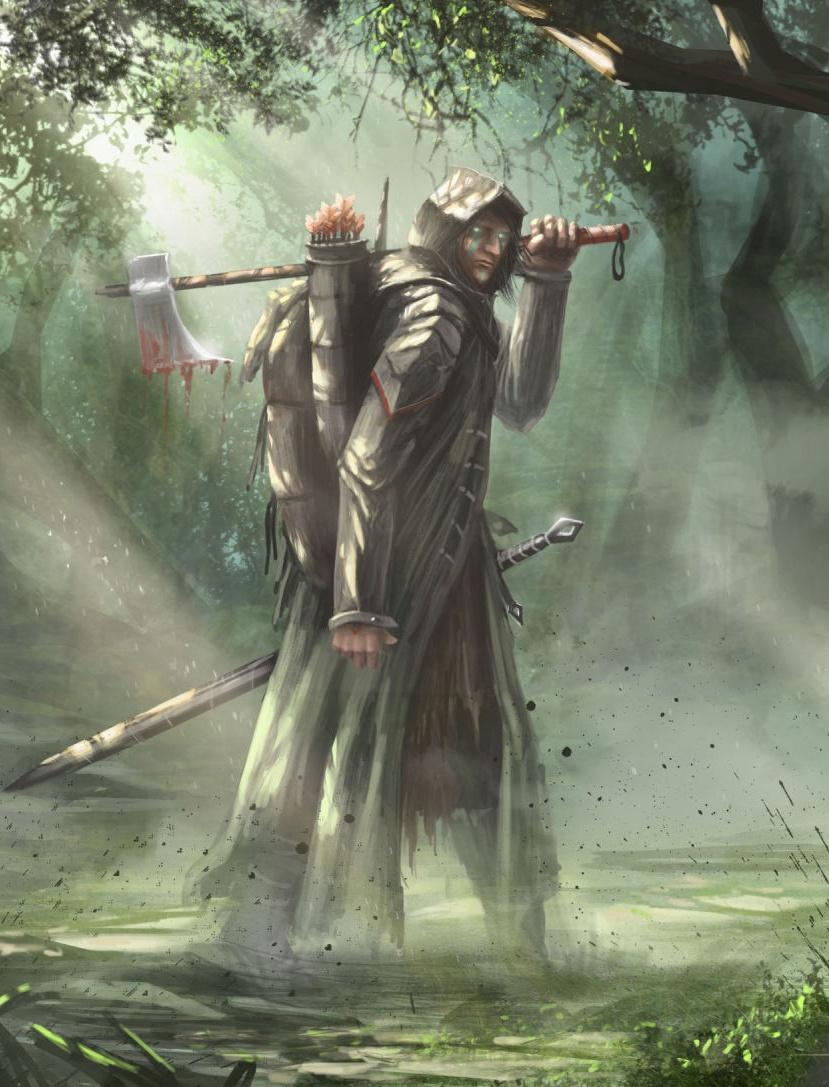
The Ranger
Rough and wild looking, a human stalks alone through the shadows of trees, hunting the orcs he knows are planning a raid on a nearby farm. Clutching a shortsword in each hand, he becomes a whirlwind of steel, cutting down one enemy after another.
After tumbling away from a cone of freezing air, an elf finds her feet and draws back her bow to loose an arrow at the white dragon. Shrugging off the wave of fear that emanates from the dragon like the cold of its breath, she sends one arrow after another to find the gaps between the dragon’s thick scales.
Holding his hand high, a half-elf whistles to the hawk that circles high above him, calling the bird back to his side. Whispering instructions in Elvish, he points to the owlbear he’s been tracking and sends the hawk to distract the creature while he readies his bow.
Far from the bustle of cities and towns, past the hedges that shelter the most distant farms from the terrors of the wild, amid the dense-packed trees of trackless forests and across wide and empty plains, rangers keep their unending watch.
Deadly Hunters
Warriors of the wilderness, rangers specialize in hunting the monsters that threaten the edges of civilization—humanoid raiders, rampaging beasts and monstrosities, terrible giants, and deadly dragons. They learn to track their quarry as a predator does, moving stealthily through the wilds and hiding themselves in brush and rubble. Rangers focus their combat training on techniques that are particularly useful against their specific favored foes.
Thanks to their familiarity with the wilds, rangers acquire the ability to cast spells that harness nature’s power, much as a druid does. Their spells, like their combat abilities, emphasize speed, stealth, and the hunt. A ranger’s talents and abilities are honed with deadly focus on the grim task of protecting the borderlands.
Independent Adventurers
Though a ranger might make a living as a hunter, a guide, or a tracker, a ranger’s true calling is to defend the outskirts of civilization from the ravages of monsters and humanoid hordes that press in from the wild. In some places, rangers gather in secretive orders or join forces with druidic circles. Many rangers, though, are independent almost to a fault, knowing that, when a dragon or a band of orcs attacks, a ranger might be the first—and possibly the last—line of defense. This fierce independence makes rangers well suited to adventuring, since they are accustomed to life far from the comforts of a dry bed and a hot bath. Faced with city-bred adventurers who grouse and whine about the hardships of the wild, rangers respond with some mixture of amusement, frustration, and compassion. But they quickly learn that other adventurers who can carry their own weight in a fight against civilization’s foes are worth any extra burden. Coddled city folk might not know how to feed themselves or find fresh water in the wild, but they make up for it in other ways.
Creating a Ranger
As you create your ranger character, consider the nature of the training that gave you your particular capabilities. Did you train with a single mentor, wandering the wilds together until you mastered the ranger’s ways? Did you leave your apprenticeship, or was your mentor slain perhaps by the same kind of monster that became your favored enemy? Or perhaps you learned your skills as part of a band of rangers affiliated with a druidic circle, trained in mystic paths as well as wilderness lore. You might be self taught, a recluse who learned combat skills, tracking, and even a mystical connection to nature through the necessity of surviving in the wilds.
What’s the source of your particular hatred of a certain kind of enemy? Did a monster kill someone you loved or destroy your home village? Or did you see too much of the destruction these monsters cause and commit yourself to reining in their depredations? Is your adventuring career a continuation of your work in protecting the borderlands, or a significant change? What made you join up with a band of adventurers? Do you find it challenging to teach new allies the ways of the wild, or do you welcome the relief from solitude that they offer?
![]()
I spend a lot of my life away form civilization, keeping to its fringes to protect it. Don't assume that because I don't bend to your king that I haven't done more to protect him than all his knights put together.
-Soveliss
Rangers are free-minded wanderers and seekers who patrol the edges of civilized territory, turning back the denizens of the wild lands beyond. It is a thankless job, since their efforts are rarely understood and almost never rewarded. Yet rangers persist in their duties, never doubting that their work makes the world a safer place.
A relationship with civilization informs every ranger's personality and history. Some rangers see themselves as enforcers of the law and bringers of justice on the civilizations frontier, answering to no sovereign power. Others area survivalists who eschew civilization altogether. They vanquish monsters to keep themselves safe while they live in and travel through the perilous wild areas of the world. If their efforts also benefit the kingdom and other civilized realms that they avoid, so be it.
If you're creating or playing a ranger character, the following sections offer ideas for embellishing the character and enhancing your role playing experience.
View of the world
A ranger's view of the world begins (and sometimes ends) with that character's outlook toward civilized folk and places they occupy. Some rangers have an attitude toward civilization that's deeply rooted in disdain, while others pity the people they have sworn to protect─though on the battlefield, it's impossible to tell the difference between one ranger and another.
Indeed, to those who have seen them operate and been the beneficiaries of their prowess, it scarcely matters why the rangers do what they do. That said, no two rangers are likely to express their opinions on any matter in the same way.
If you haven't yet thought about the details of your character worldview, consider putting a finer point on things by summarizing that viewpoint in a short statement (such as the entries on the following table). How might that feeling affect the way you conduct yourself?
| d6 | View |
|---|---|
| 1 | Towns and cities are the best place for those who can't survive on their own. |
| 2 | The advancement of civilization is the best way to thwart chaos, but its reach must be monitored. |
| 3 | Towns and cities are a necessary evil, but once the wilderness is purged of supernatural threats, we will need them no more. |
| 4 | Walls are for cowards, who huddle behind them while making others do the dirty work. |
| 5 | Visiting a town is not unpleasant, but after a few days I feel the irresistible call to return to the wilds. |
| 6 | Cities breed weakness by isolating folk from the harsh lessons of the wild. |
Homelands
All rangers, regardless of how they came to take up the profession, have a strong connection to the natural world and its various terrains. For some rangers, the wilderness is where they grew up, either as a result of being born there or moving there at a young age. For other rangers, civilization was originally home, but the wilderness became a second homeland.
Think of your character's backstory and decide what terrain feels most like home, whether or not you were born there. What does that terrain say about your personality? Does it influence which spells you choose to learn? Have your experiences there shaped who your favored enemies are?
| d6 | Homeland |
|---|---|
| 1 | You patrolled an ancient forest, darkened and corrupted by several crossings to the Shadowfell. |
| 2 | As part of a group of nomads, you acquired the skills for surviving in the desert. |
| 3 | Your early life in the Underdark prepared you for the challenges of combating its denizens. |
| 4 | You dwelled on the edges of a swamp, in an area imperiled by land creatures as well as aquatic ones. |
| 5 | Because you grew up among the peaks, finding the best path through the mountains is second nature to you. |
| 6 | You wandered the far north, learning how to protect yourself and prosper in a realm overrun by ice and snow. |
Sworn Enemy
Every ranger begins with a favored enemy (or two). The determination of a favored enemy might by tied to a specific event in the character's early life, or it might be entirely a matter of choice.
What spurred your character to select a particular enemy? Was the choice made because of tradition or curiosity, or do you have a grudge to settle?
| d6 | Enemy |
|---|---|
| 1 | You seek revenge on nature's behalf for the great transgressions your foe has committed. |
| 2 | Your forebears or predecessors fought these creatures, and so shall you. |
| 3 | You bear no emnity towards your foe. You stalk such creatures as a hunter tracks down a wild animal. |
| 4 | You find your foes fascinating, and you collect books of tales and history concerning them. |
| 5 | You collect tokens of your fallen enemies to remind you of each kill. |
| 6 | You respect your chosen enemy, and you see your battles as a test of respective skill. |
Ranger
| Level | Proficiency Bonus | Features | Fighting Styles Adopted | 1st | 2nd | 3rd | 4th | 5th |
|---|---|---|---|---|---|---|---|---|
| 1st | +2 | Favored Enemy, Ranger Conclave, Natural Explorer | — | — | — | — | — | — |
| 2nd | +2 | Fighting Style, Survivalist Magic | 1 | 2 | — | — | — | — |
| 3rd | +2 | Foe Marker, Primal Awareness | 1 | 3 | — | — | — | — |
| 4th | +2 | Ability Score Improvement | 1 | 4 | 2 | — | — | — |
| 5th | +3 | Advanced Prowess, Extra Attack | 2 | 4 | 2 | — | — | — |
| 6th | +3 | Favored Enemy Improvement, Roving | 2 | 4 | 3 | — | — | — |
| 7th | +3 | Ranger Conclave feature | 2 | 4 | 3 | — | — | — |
| 8th | +3 | Ability Score Improvement | 2 | 4 | 3 | 2 | — | — |
| 9th | +4 | Land’s Stride | 2 | 4 | 3 | 2 | — | — |
| 10th | +4 | Foe Slayer, Tireless | 2 | 4 | 3 | 3 | — | — |
| 11th | +4 | Ranger Conclave feature | 3 | 4 | 3 | 3 | — | — |
| 12th | +4 | Ability Score Improvement | 3 | 4 | 3 | 3 | 1 | — |
| 13th | +5 | Vanish | 3 | 4 | 3 | 3 | 1 | — |
| 14th | +5 | Favored Enemy Improvement | 3 | 4 | 3 | 3 | 2 | — |
| 15th | +5 | Ranger Conclave feature | 3 | 4 | 3 | 3 | 2 | — |
| 16th | +5 | Ability Score Improvement | 3 | 4 | 3 | 3 | 3 | — |
| 17th | +6 | Favored Enemy Improvement | 4 | 4 | 3 | 3 | 3 | 1 |
| 18th | +6 | Feral Senses | 4 | 4 | 3 | 3 | 3 | 1 |
| 19th | +6 | Ability Score Improvement | 4 | 4 | 3 | 3 | 3 | 2 |
| 20th | +6 | Apex Predator | 4 | 4 | 3 | 3 | 3 | 2 |
Quick Build
You can make a ranger quickly by following these suggestions. First, make Dexterity your highest ability score, followed by Wisdom, (Some rangers who focus on Great Weapon Fighting fighting make Strength higher than Dexterity). Second, choose the outlander background.
Class Features
As a ranger, you gain the following class features
Hit Points
- Hit Dice: 1d10 per ranger level
- Hit Points at 1st Level: 10 + your Constitution modifier
- Hit Points at Higher Levels: 1d10 (or 6) + your Constitution modifier per ranger level after 1st
Proficiencies
- Armor: Light armor, medium armor
- Weapons: Simple weapons, martial weapons
- Tools: Choose one type of artisan's tools, one musical instrument, or the herbalism kit
- Languages: Two languages of your choice; check with your DM before choosing an exotic language
- Saving Throws: Strength, Dexterity
- Skills: Choose three from Animal Handling, Athletics, Insight, Investigation, Nature, Perception, Stealth, and Survival
Equipment
You start with the following equipment, in addition to the equipment granted by your background:
- (a) leather armor, (b) chain shirt, or (c) scale mail
- (a) a dungeoneer's pack or (b) an explorer's pack
- two melee weapons
- a ranged weapon and a fitting container with 20 pieces of ammunition
Alternatively, you can purchase your starting equipment with a starting wealth of 5d4 x 10gp.
Favored Enemy
Beginning at 1st level, you have significant experience studying, Tracking, hunting, and even talking to a certain type of enemy.
Choose a type of Favored Enemy: Aberrations, Beasts, Celestials, Constructs, Dragons, Elementals, Fey, Fiends, Giants, Monstrosities, Oozes, Plants, or Undead. Alternatively, you can select two races of Humanoid (such as Gnolls and Orcs) as Favored Enemies.
You have a +5 bonus to all Attack Rolls, Ability Checks, Damage Rolls, and Saving Throws, made against your Favored Enemy. You also have advantage on Wisdom Checks to track your Favored Enemy, as well as on Intelligence Checks to recall information about them. You also learn two languages one of your choice and one that is spoken by your Favored Enemy, if they speak one at all.
You choose one additional Favored Enemy, as well as an associated language, at 6th, 14th, and 17th level. As you gain levels, your choices should reflect the types of creatures that you have encountered on your adventures.
Natural Explorer
Also at 1st level, you have a natural talent to roam the world and safely guide others through its deep forests and forgotten ruins. You gain the following benefits:
- Choose two skills you're proficient in; You now add double your Proficiency Bonus to ability checks using those skills.
- When you forage, you find twice as much food and water as you normally would. Even if you fail, you still find enough food and water to sustain one person for one day.
- You can guide the travel for a group of up to six creatures. While guided by you, your group can move stealthily while traveling at a normal pace and difficult terrain doesn't slow your group's travel.
- You don't suffer the -5 penalty to your passive Wisdom (Perception) score while traveling at a fast pace, and even when you are engaged in another activity while traveling — such as foraging, navigating, or tracking — you remain alert to danger.
- Difficult terrain doesn't slow your travel, and you have advantage on Intelligence (Nature) checks to identify Wilderness and Dungeon Hazards (such as Quicksand, Thin Ice, or Brown Mold).
- While tracking other creatures, you learn a rough estimate of their number, their size, and how long ago they passed through the area.
- You can track while traveling at a fast pace, and finding a trail only takes 1 minute in a confined area such as a dungeon, or 5 minutes outdoors.
- you have advantage on Dexterity (Stealth) checks against your Favored Enemy while tracking them.
- You can't become lost except by magical means.
Ranger Conclave
Finally at 1st Level, you choose a conclave that you strive to emulate, such as the Hunter. Your choice grants features at 1st Level, and again at 7th, 11th, and 15th level.
Fighting Style
Also at 2nd Level, you adopt a particular style of Fighting as your specialty. Choose one of the following options. You can’t take a Fighting Style more than once. You adopt more Fighting Styles at later levels as shown in the Fighting Styles Adopted column.
Archery
You gain a +2 bonus to Attack Rolls you make with Ranged Weapons.
Attrition
Your hit point maximum increases by 1 and then increases by 1 whenever you gain a level in this class. As a bonus action, you can choose to recover 10 hit points. You can do this once per short or long rest.
Blind Fighting
You have blindsight with a range of 30 feet. Within that range, you can effectively see anything that isn't behind total cover, even if you're blinded or in darkness. Moreover, you can see an invisible creature within that range, unless the creature successfully hides from you.
Defense
While you are wearing armor, you gain a +2 bonus to AC.
Dueling
When you are wielding a melee weapon in one hand and no other Weapons, you gain a +3 bonus to Damage Rolls with that weapon.
Druidic Warrior
You learn two cantrips of your choice from the druid spell list. They count as ranger spells for you, and Wisdom is your spellcasting ability for them. Whenever you gain a level in this class, you can replace one of these cantrips with another cantrip from the druid spell list.
Elemental Combatant. (HB)
Pick one of the following damage types: cold, fire, or lightning. You gain resistance to this damage type, and you can change the damage type of your current weapon to your chosen damage type every time you deal damage.
Interception
When a creature you can see hits a target, other than you, within 5 feet of you with an attack, you can use your reaction to reduce the damage the target takes by 1d10 + your proficiency bonus (to a minimum of 0 damage). You must be wielding a shield or a simple or martial weapon to use this reaction.
Thrown Weapon Fighting
You can draw a weapon that has the thrown property as part of the attack you make with the weapon. In addition, when you hit with a ranged attack using a thrown weapon, you gain a +3 bonus to the damage roll.
Two-Weapon Fighting
When you engage in Two-Weapon Fighting, you can add your ability modifier to the damage of the second Attack. If you have the extra attack feature, then it applies to off hand attacks that you make as well.
Spellcasting
By the time you reach 2nd level, you have learned to use the magical essence of nature to cast spells, much as a druid does.
Preparing and Casting Spells
The Ranger table shows how many spell slots you have to cast your Ragners spells of 1st level and higher. To cast one of these Ranger spells, you must expend a slot of the spell's level or higher. You regain all expended spell slots when you finish a long rest.
You prepare the list of Ranger spells that are available for you to cast, choosing from the Ranger spell list. When you do so, choose a number of Ranger spells equal to your Wisdom Modifier + half your Ranger level rounded up (minimum of one spell). The spells must be of a level for which you have spell slots.
For example, if you are a 5th-level Ranger, you have four 1st-level and two 2nd-level spell slots. With a Wisdom of 16, your list of prepared spells can include six spells of 1st or 2nd level, in any combination. If you prepare the 1st-level spell Animal Friendship, you can cast it using a 1st-level or 2nd-level slot. Casting the spell doesn't remove it from your list of prepared spells. You can also change your list of prepared spells when you finish a long rest. Preparing a new list of Ranger spells requires time spent in practice and meditation: at least 1 minute per spell level for each spell on your list.
Conclave Magic
Each Ranger Conclave has the Conclave Magic feature this feature grants you additional spells that you always have prepared, and they don't count against the number of spells you can prepare each day. You can cast these spells once without expending a spell slot. Once you cast a spell in this way, you can’t do so again until you finish a long rest.
Ritual Casting
You can cast a Ranger spell as a ritual if that spell has the ritual tag and you have the spell prepared.
Spellcasting Focus
You can use a druidic focus as a spellcasting focus for your Ranger spells.
Spellcasting Ability
Wisdom is your spellcasting ability for your ranger spells, since your magic draws on your attunement to nature. You use your Wisdom whenever a spell refers to your spellcasting ability. In addition, you use your Wisdom modifier when setting the saving throw DC for a ranger spell you cast and when making an attack roll with one.
Spell Save DC
Spell Attack Modifier
Primeval Awareness
Beginning at 3rd level, you can use your action and expend one ranger spell slot to focus your awareness on the region around you. For 1 hour per level of the spell slot you expend, you can sense whether the following types of creatures are present within 5 miles of you: Aberrations, Celestials, Dragons, Elementals, Fey, Fiends, Monstrosities, and Undead. This feature doesn’t reveal the creatures’ location but does reveal their rough number.
Foe Marker
At 3rd level level, you can choose a creature or object that you can see within 120 feet of you, and mystically mark it as your quarry for up to 1 hour as an action or bonus action.
Until the end of this effect, you deal extra damage listed on the table below to the marked target whenever you hit it with a weapon attack if the marked target is also one of your Favored Enemy, then you deal the damage as shown in the parenthesis, and you always know the exact location of the marked target.
If the target drops to 0 hit points before this effect ends, you can use a bonus action or reaction to mark a new target within 60 feet of you. This effect also ends early if you select another target before the current targets duration ends, or dies.
| Ranger Level | Foe Marker Damage |
|---|---|
| 3rd | 1d6 (3d6) |
| 5th | 1d8 (3d8) |
| Ranger Level | Foe Marker Damage |
|---|---|
| 11th | 1d10 (3d10) |
| 17th | 1d12 (3d12) |
You can use this feature a number of times equal to your Proficiency Bonus, you regain all expended uses when you roll for initiative or finish a short or long rest.
Additionally, you can choose to spend a spell slot instead of spending a use of this feature. When you choose to spend a spell slot, this features duration increases by a number of hours equal to your level multiplied by the spell slots level.
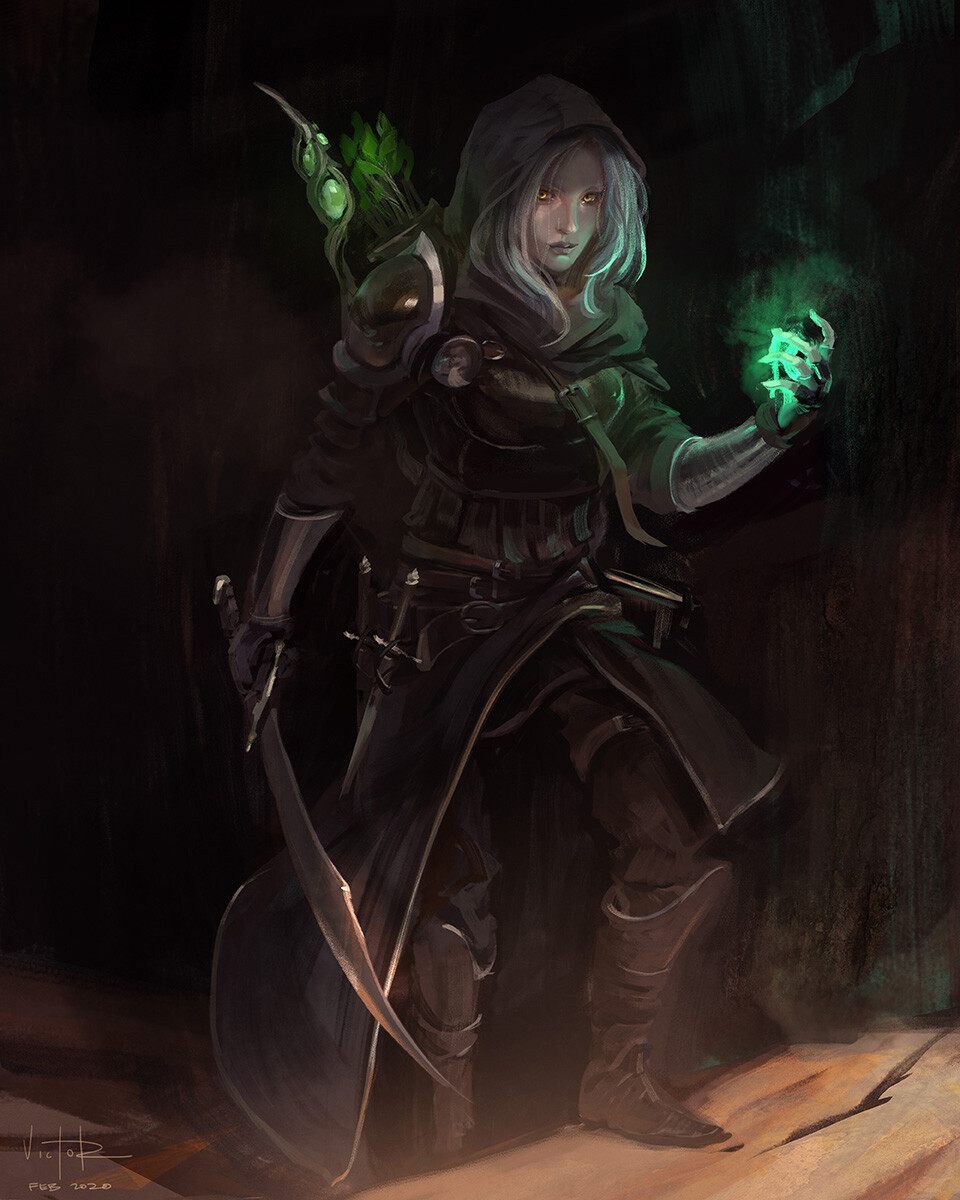








Ability Score Improvement
When you reach 4th Level, and again at 8th, 12th, 16th, and 19th level, you can increase one ability score of your choice by 2, or you can increase two Ability Scores of your choice by 1. As normal, you can’t increase an ability score above 20 using this feature.
Advanced Prowess
Starting at 5th level, your martial capabilities have advanced so far to the point of being supernatural. All attacks you make and damage you deal, counts as magical for the purposes of overcoming resistance and immunity to nonmagical attacks.
Additionally, you can add half your Proficiency Bonus (rounded down) to attack and damage rolls you make. However, if you have a magical weapon that provides a higher Attack and Damage Bonus than this feature, the weapon overrides this feature.
Extra Attack
Also at 5th level, you can attack twice instead of once, whenever you take the attack action. Moreover, you can cast one of your cantrips in place of one of those attacks if you know a cantrip that requires an action to cast.
Roving
At 6th level, your walking speed increases by 15 feet, and you gain a climbing speed and a swimming speed equal to your walking speed.
Additionally, you can take the Dash action as a bonus action on your turn if there are no enemies within 15 feet.
Land's Stride
Starting at 9th level, moving through nonmagical Difficult Terrain costs you no extra Movement. You can also pass through nonmagical Plants without being slowed by them and without taking damage from them if they have thorns, spines, or a similar hazard.
In addition, you have advantage on Saving Throws against Plants that are magically created or manipulated to impede Movement, such those created by the Entangle spell.
Foe Slayer
At 10th level, you have learned to spot and exploit weaknesses in your enemy's defense.
When you mark a target with your Foe Marker, attacks you make at your marked target now score a critical hit on rolls of 19-20. Moreover, when you land a critical hit on a marked target, the roll you need to score to roll a critical hit is lowered by one to a minimum of 10-20.
Tireless
At 10th level, as an action, you can give yourself a number of non-stackable temporary hit points equal to 1d10 + your Wisdom modifier.
You can use this special action a number of times equal to your Wisdom modifier (a minimum of once), and you regain all expended uses when you finish a long rest.
In addition, whenever you finish a short rest, your exhaustion level, if any, is decreased by 1.
Vanish
Starting at 13th level, you can use a bonus action to become nonmagically invisible, along with any equipment you are wearing or carrying, until the start of your next turn.
Once you use this feature, you can’t use it again until you finish a short or long rest.
Additionally, you can use the Hide action as a Bonus Action on Your Turn. Also, you can't be tracked by normal or magical means, unless you choose to leave a trail.
Feral Senses
At 18th level, you gain preternatural senses that help you fight creatures you can’t see. When you attack a creature you can’t see, your inability to see it doesn’t impose disadvantage on your attack rolls against it.
You are also aware of the location of any invisible creature within 30 feet of you, provided that the creature isn’t hidden from you and you aren’t blinded or deafened.
Apex Predator
At 20th level, you learned how to act with incredible speed.
Once per round, after another creature has taken its turn, you can take a special action. You can use this special action to move up to half your movement speed and take either the Dash, Disengage, Hide, or Use an Object action.
If you are surprised at the start of an encounter, you are not surprised but you do not gain this extra action in the first round of combat, instead you gain advantage on your first attack roll.
Ranger Conclaves
The ideal of the ranger has a few classic expressions: the Beast Master, the Gloom Stalker, the Horizon Walker, the Hunter, the Monster Slayer, and the Primeval Guardian
Ranger Conclave: Beast Master
The Beast Master archetype embodies a friendship between the civilized races and the beasts of the wild. United in focus, beast and ranger fight the monsters that threaten civilization and the wilderness alike.
Source: By Dracodruid
Conclave Magic: Beast Master
You learn an additional spell when you reach certain levels in this class, as shown in the Beast Master Spells table. The spell counts as a ranger spell for you, and it doesn't count against the number of ranger spells that you can prepare each day.
| Ranger Level | Spells |
|---|---|
| 1st | Find Familiar |
| 5th | Healing Spirit |
| 9th | Conjure Animals |
| 13th | Guardian of Nature |
| 17th | Insect Plague |
Primal Beast Companion
Beginning at 1st level, you can magically summon a primal beast, which draws strength from your bond with nature. The beast is friendly to you and your companions and obeys your commands. Choose its stat block — Beast of the Land, Beast of the Sea, or Beast of the Sky — which uses your proficiency bonus (PB) in several places. You also determine the kind of animal the beast is, choosing a kind appropriate for the stat block. Whatever kind you choose, the beast bears primal markings, indicating its mystical origin.
In combat, the beast acts during your turn. It can move and use its reaction on its own, but the only action it takes is the Dodge action, unless you take a bonus action on your turn to command it to take another action. That action can be one in its stat block or some other action. You can also sacrifice one of your attacks when you take the Attack action to command the beast to take the Attack action. If you are incapacitated, the beast can take any action of its choice, not just Dodge.
If the beast has died within the last hour, you can use your action to touch it and expend a spell slot. The beast returns to life after 1 minute with all its hit points restored.
When you finish a long rest, you can summon a different primal beast. The new beast appears in an unoccupied space within 5 feet of you, and you choose its stat block and appearance. If you already have a beast from this feature, it vanishes when the new beast appears. The beast also vanishes if you die.
Mythic Bond
Beginning at 7th level, the beast's attacks now count as magical for the purpose of overcoming resistance and immunity to nonmagical attacks and damage.
In addition, when you cast a spell targeting yourself, you can take a bonus action to also affect your beast companion with the spell if the beast is within 30 feet of you.
Bestial Fury
Starting at 11th level, when you command your beast companion to take the Attack action with your bonus action, the beast can attack twice, instead of once.
Superior Beast Defense
At 15th level, whenever an attacker that your companion can see hits it with an attack, it can use its reaction to halve the attack’s damage against it.
In addition, when the beast is subjected to an effect that allows it to make a Dexterity saving throw to take only half damage, it instead takes no damage if it succeeds on the saving throw, and only half damage if it fails.

Beast of the Land
Medium beast
- Armor Class 13 + PB (natural armor)
- Hit Points 5 + five times your ranger level (the beast has a number of Hit Dice [d8s] equal to your ranger level)
- Speed 40 ft., climb 40 ft.
STR DEX CON INT WIS CHA 14 (+2) 14 (+2) 14 (+2) 8 (-1) 14 (+2) 11 (+0)
- Senses Darkvision 60 ft., passive Perception 12 + PB
- Languages understands the languages you speak
- Proficiency Bonus (PB) equals your bonus
Beast of the Sea
Medium beast
- Armor Class 13 + PB (natural armor)
- Hit Points 5 + five times your ranger level (the beast has a number of Hit Dice [d8s] equal to your ranger level)
- Speed 5 ft., swim 60 ft.
STR DEX CON INT WIS CHA 14 (+2) 14 (+2) 14 (+2) 8 (-1) 14 (+2) 11 (+0)
- Senses Darkvision 60 ft., passive Perception 12 + PB
- Languages understands the languages you speak
- Proficiency Bonus (PB) equals your bonus
Beast of the Sky
Small beast
- Armor Class 13 + PB (natural armor)
- Hit Points 4 + four times your ranger level (the beast has a number of Hit Dice [d6s] equal to your ranger level)
- Speed 10 ft., fly 60 ft.
STR DEX CON INT WIS CHA 6 (-2) 16 (+3) 13 (+1) 8 (-1) 14 (+2) 11 (+0)
- Senses Darkvision 60 ft., passive Perception 12 + PB
- Languages understands the languages you speak
- Proficiency Bonus (PB) equals your bonus
Charge. If the beast moves at least 20 feet straight toward a target and then hits it with a maul attack on the same turn, the target takes an extra 1d8 slashing damage. If the target is a creature, it must succeed on a Strength saving throw against your spell save DC or be knocked prone.
Primal Bond. You can add your proficiency bonus to any ability check or saving throw that the beast makes.
Actions
Maul. Melee Weapon Attack: your spell attack modifier to hit, range 5 ft., one target. Hit: 1d8 + 2 + PB slashing damage.
Amphibious. The beast can breathe both air and water.
Primal Bond. You can add your proficiency bonus to any ability check or saving throw that the beast makes.
Actions
Binding Strike. Melee Weapon Attack: your spell attack modifier to hit, reach 5 ft., one target. Hit: 1d8 + 2 + PB piercing or bludgeoning damage (your choice), and the target is grappled (escape DC equals your spell save DC). Until this grapple ends, the beast can’t use this attack on another target.
Flyby. The beast doesn't provoke opportunity attacks when it flies out of an enemy's reach.
Primal Bond. You can add your proficiency bonus to any ability check or saving throw that the beast makes.
Actions
Shred. Melee Weapon Attack: your spell attack modifier to hit, range 5 ft., one target. Hit: 1d6 + 3 + PB slashing damage.
Ranger Conclave: Drakewarden
Your connection to the natural world takes the form of a draconic spirit, which can manifest in physical form as a drake. As your powers grow, your drake grows as well, blossoming from a small four-legged companion to a majestic winged creature large and strong enough for you to ride. Along the way, you gain an increasing share of the awe-inspiring power of dragons.
Consider the source of the draconic spirit you have bonded with. The Drakewarden Origin table offers examples.
Source: Fizban's Treasury of Dragons
Drakewarden Origin
| d6 | Origins |
|---|---|
| 1 | You studied a dragon’s scale or claw, or a trinket from a dragon’s hoard, creating your bond through that token’s lingering draconic magic. |
| 2 | A secret order of rangers who collect and guard draconic lore taught you their ways. |
| 3 | A dragon gave you a geode or gemstone to care for. To your surprise, the drake hatched from that stone. |
| 4 | You ingested a few drops of dragon blood, forever infusing your nature magic with draconic power. |
| 5 | An ancient Draconic inscription on a standing stone empowered you when you read it aloud. |
| 6 | You had a vivid dream of a mysterious figure accompanied by seven yellow canaries, who warned you of impending doom. When you awoke, your drake was there, watching you. |
Conclave Magic: Drakewarden
You learn an additional spell when you reach certain levels in this class, as shown in the Drakewarden Spells table. The spell counts as a ranger spell for you, and it doesn't count against the number of ranger spells that you can prepare each day.
| Ranger Level | Spells |
|---|---|
| 1st | Chromatic Orb |
| 5th | Locate Object |
| 9th | Fear |
| 13th | Polymorph |
| 17th | Hold Monster |
Draconic Gift
Starting at 1st level, the bond you share with your drake creates a connection to dragonkind, granting you understanding and empowering your presence.
You learn the Thaumaturgy cantrip, which is a ranger spell for you, and you learn to speak, read, and write Draconic or one other language of your choice.
Drake Companion
Also at 1st level, as an action, you can magically summon the drake that is bound to you. It appears in an unoccupied space of your choice within 30 feet of you.
The drake is friendly to you and your companions, and it obeys your commands. See its game statistics in the accompanying Drake Companion stat block, which uses your proficiency bonus (PB) in several places. Whenever you summon the drake, choose a damage type listed in its Draconic Essence trait. You can determine the cosmetic characteristics of the drake, such as its color, its scale texture, or any visible effect of its Draconic Essence; your choice has no effect on its game statistics.
In combat, the drake shares your initiative count, but it takes its turn immediately after yours. It can move and use its reaction on its own, but the only action it takes on its turn is the Dodge action, unless you take a bonus action on your turn to command it to take another action. That action can be one in its stat block or some other action. If you are incapacitated, you now control the drake and the drake can take any action of its choice, not just Dodge.
The drake remains until it is reduced to 0 hit points, until you use this feature to summon the drake again, or until you die. Anything the drake was wearing or carrying is left behind when the drake vanishes.
Once you summon the drake, you can’t do so again until you finish a long rest, unless you expend a spell slot of 1st level or higher to summon it.
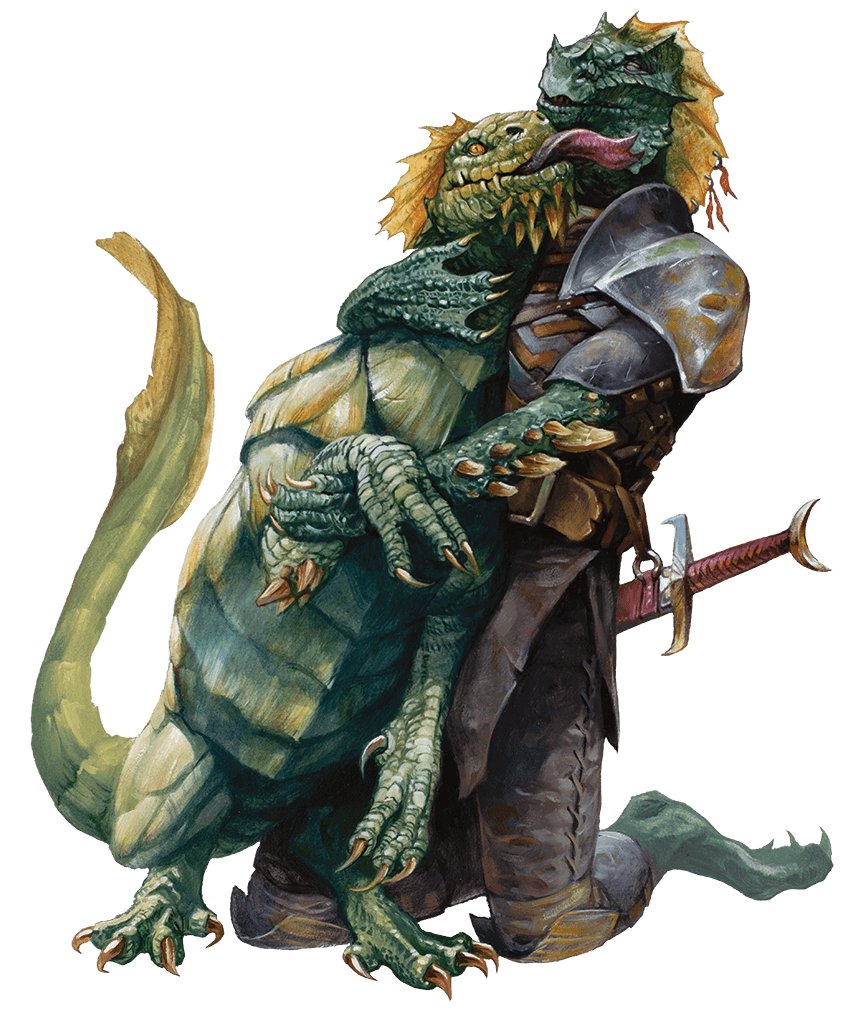
Drake Companion
Small Dragon
- Armor Class 14 + PB (natural armor)
- Hit Points 5 + five times your ranger level (the drake has a number of hit dice [d10s] equal to your ranger level)
- Speed 40 ft., climb 40 ft.
STR DEX CON INT WIS CHA 16 (+3) 12 (+1) 16 (+3) 10 (0) 14 (+2) 11 (+0)
- Damage Immunities: determined by the drake’s Draconic Essence trait
- Senses Darkvision 60 ft., passive Perception 12 + PB
- Languages understands the languages you speak
- Proficiency Bonus (PB) equals your bonus
Draconic Essence. When you summon the drake, choose a damage type: acid, cold, fire, lightning, or poison. The chosen type determines the drake’s damage immunity and the damage of its Infused Strikes trait.
Primal Bond. You can add your proficiency bonus to any ability check or saving throw that the beast makes.
Actions
Bite/Maul. Melee Weapon Attack: +3 plus PB to hit, reach 5 ft., one target. Hit: 1d8 + 3 + PB piercing or slashing damage (your choice).
Reactions
Infused Strikes. When another creature within 30 feet of the drake that it can see hits a target with a weapon attack, the drake infuses the strike with its essence, causing the target to take an extra 1d6 damage of the type determined by its Draconic Essence.
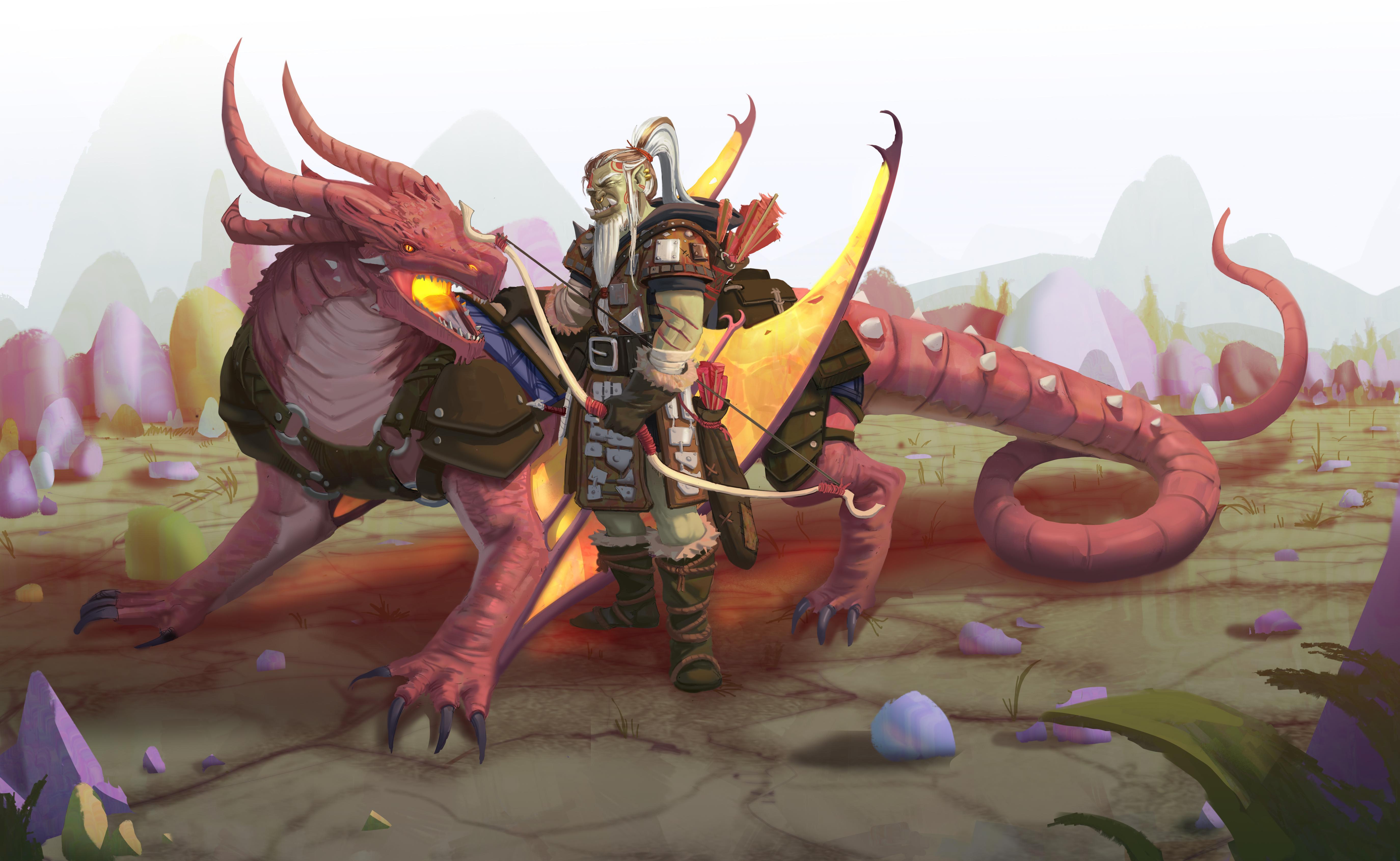




Bond of Fang and Scale
At 7th level the bond you share with your drake intensifies, protecting you and stoking the drake’s fury. When you summon your drake, it grows wings on its back and gains a flying speed equal to its walking speed.
In addition, you and your drake companion gain the following benefits:
Drake Mount. The drake grows to Medium size. Reflecting your special bond, you can use the drake as a mount if your size is Medium or smaller. While you are riding your drake, it can’t use the flying speed of this feature.
Magic Fang. The drake’s Bite attack deals an extra 1d6 damage of the type chosen for the drake’s Draconic Essence.
Resistance. You gain resistance to the damage type chosen for the drake’s Draconic Essence.
Drake’s Breath
At 11th level, as an action, you can exhale a 30-foot cone of damaging breath or cause your drake to exhale it. Choose acid, cold, fire, lightning, or poison damage (your choice doesn’t have to match your drake’s Draconic Essence). Each creature in the cone must make a Dexterity saving throw against your spell save DC, taking 8d6 damage on a failed save, or half as much damage on a successful one.
This damage increases to 10d6 when you reach 15th level in this class.
Once you use this feature, you can’t do so again until you finish a long rest, unless you expend a spell slot of 3rd level or higher to use it again.
Perfected Bond
At 15th level, your bond to your drake reaches the pinnacle of its power. While your drake is summoned, you and the drake gain the following benefits:
Empowered Bite. The drake’s Bite attack deals an extra 1d6 damage of the type chosen for its Draconic Essence (for a total of 2d6 extra damage).
Large Drake. The drake grows to Large size. When you ride your drake, it is no longer prohibited from using the flying speed of Bond of Fang and Scale.
Reflexive Resistance. When either you or the drake takes damage while you’re within 30 feet of each other, you can use your reaction to give yourself or the drake resistance to that instance of damage. You can use this reaction a number of times equal to your proficiency bonus, and you regain all expended uses when you finish a long rest.
Ranger Conclave: Fey Wanderer
A fey mystique surrounds you, thanks to the boon of an archfey, the shining fruit you ate from a talking tree, the magic spring you swam in, or some other auspicious event. However you acquired your fey magic, you are now a Fey Wanderer, a ranger who represents both the mortal and the fey realms. As you wander the multiverse, your joyful laughter brightens the hearts of the downtrodden, and your martial prowess strikes terror in your foes, for great is the mirth of the fey and dreadful is their fury.
Source: Tasha's Cauldron of Everything
Gifts of the Feywild
| d6 | Gift |
|---|---|
| 1 | Illusory butterflies flutter around you while you take a short or long rest. |
| 2 | Fresh, seasonal flowers sprout from your hair each dawn. |
| 3 | You faintly smell of cinnamon, lavender, nutmeg, or another comforting herb or spice. |
| 4 | Your shadow dances while no one is looking directly at it. |
| 5 | Horns or antlers sprout from your head. |
| 6 | Your skin and hair change color to match the season at each dawn. |
Conclave Magic: Fey Wanderer
You learn an additional spell when you reach certain levels in this class, as shown in the Fey Wanderer Spells table. The spell counts as a ranger spell for you, and it doesn't count against the number of ranger spells that you can prepare each day.
| Ranger Level | Spells |
|---|---|
| 1st | Charm Person |
| 5th | Misty Step |
| 9th | Dispel Magic |
| 13th | Dimension Door |
| 17th | Mislead |
Dreadful Strikes
At 1st level, you can augment your weapon strikes with mind-scarring magic, drawn from the gloomy hollows of the Feywild. When you hit a creature with a weapon, you can deal an extra 1d4 psychic damage to the target.
The damage from this feature increases when you reach later levels in this class, 2d4 damage at 7th level, 3d4 at 11th level, and 4d4 damage at 15th level.
Otherworldly Glamour
Additionally at 1st level, your fey qualities give you a supernatural charm. As a result, whenever you make a Charisma check, you gain a bonus to the check equal to your Wisdom modifier (minimum of +1).
In addition, you learn to speak, read, and write Sylvan or one other language of your choice, and you gain proficiency in one of the following skills of your choice: Deception, Performance, or Persuasion.
Beguiling Twist
Beginning at 7th level, the magic of the Feywild guards your mind. You have advantage on saving throws against being charmed or frightened.
In addition, whenever you or a creature you can see within 120 feet of you succeeds on a saving throw against being charmed or frightened, you can use your reaction to force a different creature you can see within 120 feet of you to make a Wisdom saving throw against your spell save DC.
If the save fails, the target is charmed or frightened by you (your choice) for 1 minute. The target can repeat the saving throw at the end of each of its turns, ending the effect on itself on a successful save.
Fey Reinforcements
At 11th level, the royal courts of the Feywild have blessed you with the assistance of fey beings: you know the spell Summon Fey. It doesn't count against the number of ranger spells you know, and you can cast it without a material component. You can also cast it once without using a spell slot, and you regain the ability to do so when you finish a long rest.
Whenever you start casting the spell, you can modify it so that it doesn't require concentration. If you do so, the spell's duration becomes 1 minute for that casting.
Misty Wanderer
When you reach 15th level, you can slip in and out of the Feywild to move in a blink of an eye: you can cast Misty Step without expending a spell slot. You can do so a number of times equal to your Wisdom modifier (minimum of once), and you regain all expended uses when you finish a long rest.
In addition, whenever you cast Misty Step, you can bring along one willing creature you can see within 5 feet of you. That creature teleports to an unoccupied space of your choice within 5 feet of your destination space.
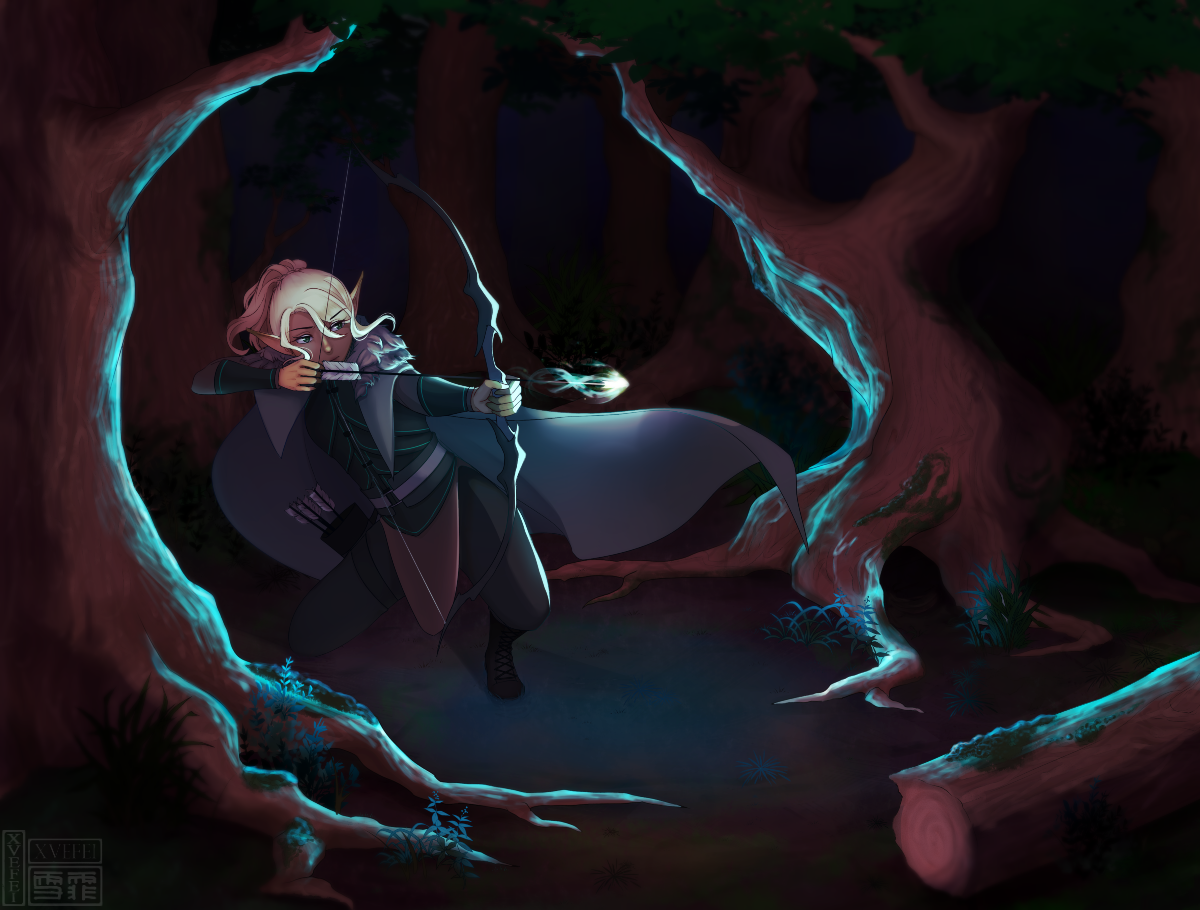


Ranger Conclave: Gloom Stalker
Gloom stalkers are at home in the darkest places: deep under the earth, in gloomy alleyways, in primeval forests, and wherever else the light dims. Most folk enter such places with trepidation, but a gloom stalker ventures boldly into the darkness, seeking to ambush threats before they can reach the broader world. Such rangers are often found in the Underdark, but they will go any place where evil lurks in the shadows.
Source: Xanathar's Guide to Everything
Conclave Magic: Gloom Stalker
You learn an additional spell when you reach certain levels in this class, as shown in the Gloom Stalker Spells table. The spell counts as a ranger spell for you, and it doesn't count against the number of ranger spells that you can prepare each day.
| Ranger Level | Spells |
|---|---|
| 1st | Disguise Self |
| 5th | Rope Trick |
| 9th | Fear |
| 13th | Greater Invisibility |
| 17th | Seeming |
Dread Ambusher
At 1st level, you master the art of the ambush. You can give yourself a bonus to your initiative rolls equal to your Wisdom modifier.
At the start of your first turn of each combat, your walking speed increases by 10 feet, which lasts until the end of that turn. If you take the Attack action on that turn, you can make one additional weapon attack as part of that action. If that attack hits, the target takes an extra 3d6 damage of the weapon's damage type.
Umbral Sight
Also at 1st level, you gain darkvision out to a range of 60 feet. If you already have darkvision from your race, its range increases by 30 feet.
You are also adept at evading creatures that rely on darkvision. While in darkness, you are invisible to any creature that relies on darkvision to see you in that darkness.
Iron Mind
By 7th level, you have honed your ability to resist the mind-altering powers of your prey. You gain proficiency in Wisdom saving throws. If you already have this proficiency, you instead gain proficiency in Intelligence or Charisma saving throws (your choice).
Stalker's Flurry
At 11th level, you learn to attack with such unexpected speed that you can turn a miss into another strike. Once on each of your turns when you miss with a weapon attack, you can make another weapon attack as part of the same action.
Shadowy Dodge
Starting at 15th level, you can dodge in unforeseen ways, with wisps of supernatural shadow around you. Whenever a creature makes an attack roll against you and doesn't have advantage on the roll, you can use your reaction to impose disadvantage on it. You must use this feature before you know the outcome of the attack roll.
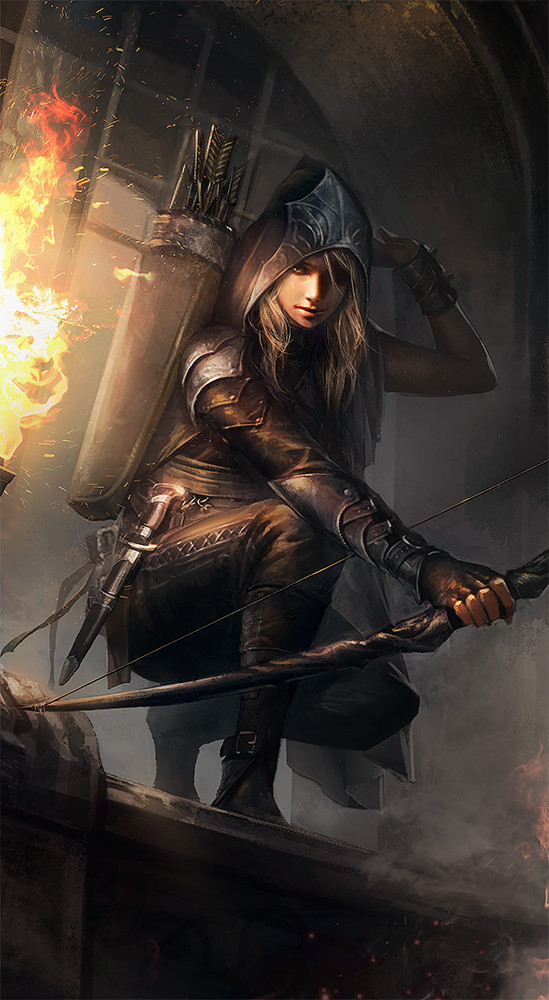




Ranger Conclave: Horizon Walker
Horizon walkers guard the world against threats that originate from other planes or that seek to ravage the mortal realm with otherworldly magic. They seek out planar portals and keep watch over them, venturing to the Inner Planes and the Outer Planes as needed to pursue their foes. These rangers are also friends to any forces in the multiverse – especially benevolent dragons, fey, and elementals – that work to preserve life and the order of the planes.
Source: Xanathar's Guide to Everything
Conclave Magic: Horizon Walker
You learn an additional spell when you reach certain levels in this class, as shown in the Horizon Walker Spells table. The spell counts as a ranger spell for you, and it doesn't count against the number of ranger spells that you can prepare each day.
| Ranger Level | Spells |
|---|---|
| 1st | Protection from Evil and Good |
| 5th | Misty Step |
| 9th | Haste |
| 13th | Banishment |
| 17th | Teleportation Circle |
Detect Portal
At 1st level, you gain the ability to magically sense the presence of a planar portal. As an action, you detect the distance and direction to the closest planar portal within 1 mile of you. If a portal is within 600 feet of you, you can sense which plane that the portal is connected to when you use this feature.
See the "Planar Travel" section in chapter 2 of the Dungeon Master's Guide for examples of planar portals.
Planar Warrior
Also at 1st level, you learn to draw on the energy of the multiverse to augment your attacks.
As a bonus action, the next time you hit a target with a weapon attack, all damage dealt by the attack becomes force damage, and the target takes an extra 1d10 force damage from the attack.
The damage from this feature increases when you reach later levels in this class, 2d10 damage at 7th level, 3d10 at 11th level, and 4d10 damage at 15th level.
Ethereal Step
At 7th level, you learn to step through the Ethereal Plane. As a bonus action on your turn, you can cast the Etherealness spell with this feature, without expending a spell slot, but the spell ends at the end of the current turn or at the start of your next turn (your choice).
Once you use this action, you can’t use it again until after you finish a long rest, or until you expend a spell slot to use it again.
Distant Strike
At 11th level, you gain the ability to pass between the planes in a blink of an eye. When you use the Attack action, you can teleport up to 10 feet before each attack to an unoccupied space you can see.
If you attack at least two different creatures with the action, you can make one additional attack with it against a third creature.
Spectral Defense
At 15th level, your ability to move between planes enables you to slip through the planar boundaries to lessen the harm done to you during battle. When you take damage from an attack, you can use your reaction to give yourself resistance to all of that attacks damage on this turn.
Additionally, you've learned how to trespass through the barrier between planes, you can cast planeshift without material components once per long rest. You still require a tuning fork if your target plane is not open.
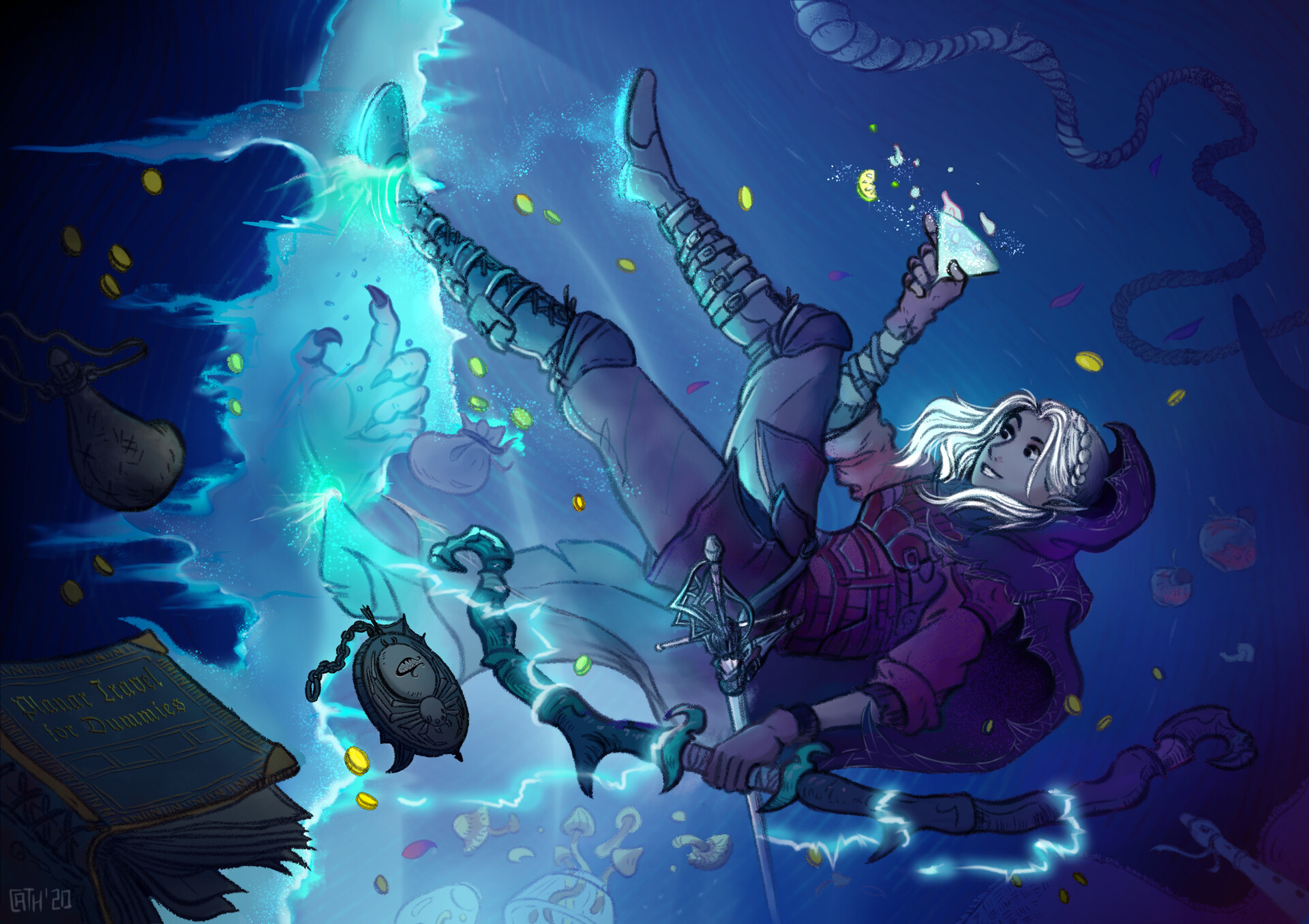

Ranger Conclave: Hunter
Emulating the Hunter archetype means accepting your place as a bulwark between civilization and the terrors of the wilderness. As you walk the Hunter’s path, you learn specialized techniques for fighting the threats you face, from rampaging ogres and hordes of orcs to towering giants and terrifying dragons.
Source: Player's Handbook
Conclave Magic: Hunter
You learn an additional spell when you reach certain levels in this class, as shown in the Hunter Spells table. The spell counts as a ranger spell for you, and it doesn't count against the number of ranger spells that you can prepare each day.
| Ranger Level | Spells |
|---|---|
| 1st | Zephyr Strike |
| 5th | Spike Growth |
| 9th | Haste |
| 13th | Freedom of Movement |
| 17th | Steel Wind Strike |
Hunters Stamina
At 1st level, you have stamina on par with your fellow hunting beasts. You gain an extra 15 feet of movement, and you gain the ability to recover a number of hit points equal to 3d4 + your Ranger level upon finishing a short rest.
Hunter’s Prey
Also at 1st level, you gain one of the following features of your choice.
Colossus Slayer Your tenacity can wear down the most potent foes. When you hit a creature with a weapon attack, the creature takes an extra 1d12 damage if it’s below its hit point maximum.
Giant Killer When a Large or larger creature within 5 feet of you hits or misses you with an attack, you can use your reaction to attack that creature immediately after its attack, provided that you can see the creature.
Horde Breaker Once on each of your turns when you make a weapon attack, you can make another attack with the same weapon against a different creature that is within 5 feet of the original target and within range of your weapon.
Defensive Tactics
At 7th level, you gain one of the following features of your choice.
Escape the Horde Opportunity attacks against you are made with disadvantage.
Multiattack Defense When a creature hits you with an attack, you gain a +4 bonus to AC against all subsequent attacks made by that creature for the rest of the turn.
Steel Will You have advantage on saving throws against being charmed and frightened.
Multiattack
At 11th level, you gain one of the following features of your choice.
Volley You can use your action to make a ranged attack against any number of creatures within 10 feet of a point you can see within your weapon’s range. You must have ammunition for each target, as normal, and you make a separate attack roll for each target.
Whirlwind Attack You can use your action to make a melee attack against any number of creatures within 5 feet of you, with a separate attack roll for each target.
Superior Hunter’s Defense
At 15th level, you gain one of the following features of your choice.
Evasion When you are subjected to an effect, such as a red dragon’s fiery breath or a lightning bolt spell, that allows you to make a Dexterity saving throw to take only half damage, you instead take no damage if you succeed on the saving throw, and only half damage if you fail.
Stand Against the Tide When a hostile creature misses you with a melee attack, you can use your reaction to force that creature to repeat the same attack against another creature (other than itself) of your choice.
Uncanny Dodge When an attacker that you can see hits you with an attack, you can use your reaction to halve the attack’s damage against you.







Ranger Conclave: Monster Slayer
You have dedicated yourself to hunting down creatures of the night and wielders of grim magic. A monster slayer seeks out vampires, dragons, evil fey, fiends, and other magical threats. Trained in supernatural techniques to overcome such monsters, slayers are experts at unearthing and defeating mighty, mystical foes.
Source: Xanathar's Guide to Everything
Conclave Magic: Monster Slayer
You learn an additional spell when you reach certain levels in this class, as shown in the Monster Slayer Spells table. The spell counts as a ranger spell for you, and it doesn't count against the number of ranger spells that you can prepare each day.
| Ranger Level | Spells |
|---|---|
| 1st | Protection from Evil and Good |
| 5th | Zone of Truth |
| 9th | Magic Circle |
| 13th | Banishment |
| 17th | Hold Monster |
Hunter's Sense
At 1st level, you gain the ability to peer at a creature and magically discern how best to hurt it. As an action, choose one creature you can see within 60 feet of you. You immediately learn whether the creature has any damage immunities, resistances, or vulnerabilities and what they are. If the creature is hidden from divination magic, you sense that it has no damage immunities, resistances, or vulnerabilities.
You can use this feature a number of times equal to your Wisdom modifier (minimum of once). You regain all expended uses of it when you finish a long rest.
Slayer's Prey
Also at 1st level, you can focus your ire on one foe, increasing the harm you inflict on it. As a bonus action, you designate one creature you can see within 60 feet of you as the target of this feature. The first time each turn that you hit that target with a weapon attack, it takes an extra 1d12 damage from the weapon.
This benefit lasts until you finish a short or long rest. It ends early if you designate a different creature.
Supernatural Defense
At 7th level, you gain extra resilience against your prey’s assaults on your mind and body. Whenever the target of your Slayer’s Prey forces you to make a saving throw and whenever you make an ability check to escape that target's grapple, add 1d8 to your roll.
Magic-User's Nemesis
At 11th level, you gain the ability to thwart someone else's magic. When you see a creature casting a spell or teleporting within 60 feet of you, you can use your reaction to try to magically foil it. The creature must succeed on a Intelligence, Wisdom, or Charisma saving throw (Your choice) against your spell save DC, or its spell or teleport fails and is wasted.
Once you use this feature, you can't use it again until you finish a short or long rest, or until you spend a spell slot to use it again.
Slayer's Counter
At 15th level, you gain the ability to counterattack when your prey tries to sabotage you. If the target of your Slayer’s Prey forces you to make a saving throw, you can use your reaction to make one weapon attack against the quarry. You make this attack immediately before making the saving throw. If the attack hits, your save automatically succeeds, in addition to the attack’s normal effects.
Ranger Conclave: Swarmkeeper
Feeling a deep connection to the environment around them, some rangers reach out through their magical connection to the world and bond with a swarm of nature spirits. The swarm becomes a potent force in battle, as well as helpful company for the ranger. Some Swarmkeepers are outcasts or hermits, keeping to themselves and their attendant swarms rather than dealing with the discomfort of others. Other Swarmkeepers enjoy building vibrant communities that work for the mutual benefit of all those they consider part of their swarm.
Source: Tasha's Cauldron of Everything
Conclave Magic: Swarmkeeper
You learn an additional spell when you reach certain levels in this class, as shown in the Swarmkeeper Spells table. The spell counts as a ranger spell for you, and it doesn't count against the number of ranger spells that you can prepare each day.
| Ranger Level | Spells |
|---|---|
| 1st | Faerie Fire |
| 5th | Web |
| 9th | Gaseous Form |
| 13th | Arcane Eye |
| 17th | Insect Plague |
Gathered Swarm
At 1st level, a swarm of intangible nature spirits has bonded itself to you and can assist you in battle. While you’re alive, the swarm remains in your space, crawling on you or flying and skittering around you within your space. You determine its appearance, or you generate its appearance by rolling on the Swarm Appearance table.
Swarm Appearance
| d4 | Appearance |
|---|---|
| 1 | Swarming Insects |
| 2 | Miniature Twig Blights |
| 3 | Fluttering Birds |
| 4 | Playful pixies |
Once on each of your turns, you can cause the swarm to assist you in one of the following ways, immediately after you hit a creature with an attack:
- The attack's target takes 3d6 piercing damage from the swarm.
- The attack's target must succeed on a Strength saving throw against your spell save DC or be moved by the swarm up to 15 feet in a direction of your choice.
- You are moved by the swarm 15 feet in a direction of your choice without suffering Attack of Opportunity.
Swarming Magic
Also at 1st level, you learn the Druidcraft and Mage Hand cantrips if you don't already know them. When you cast Mage Hand, the hand takes the form of your Gathered Swarm.
Writhing Tide
At 7th level, you can condense part of your swarm into a focused mass that lifts you up. As a bonus action, you gain a flying hover speed of 30 feet and can hover. This effect lasts for 1 minute or until you are incapacitated.
You can use this feature a number of times equal to your proficiency bonus, and you regain all expended uses when you finish a short or long rest.
Mighty Swarm
At 11th level, your Gathered Swarm grows mightier in the following ways:
- The damage of Gathered Swarm increases to 3d12.
- If a creature fails its saving throw against being moved by the Gathered Swarm, you can also cause the swarm to knock the creature prone.
- When you are moved by Gathered Swarm, it gives you half cover until the start of your next turn.
Additionally, when you land an Attack of Opportunity, you can use your Gathered Swarm upon them without spending your use of the ability that turn.
Swarming Dispersal
When you reach 15th level, you can discorporate into your swarm, avoiding danger. When you take damage, you can use your reaction to give yourself resistance to that damage. You vanish into your swarm and then teleport to an unoccupied space within 30 feet of you, where you reappear with the swarm.
You can use this feature a number of times equal to your Proficiency Bonus, and you regain all expended uses when you finish a short or long rest.
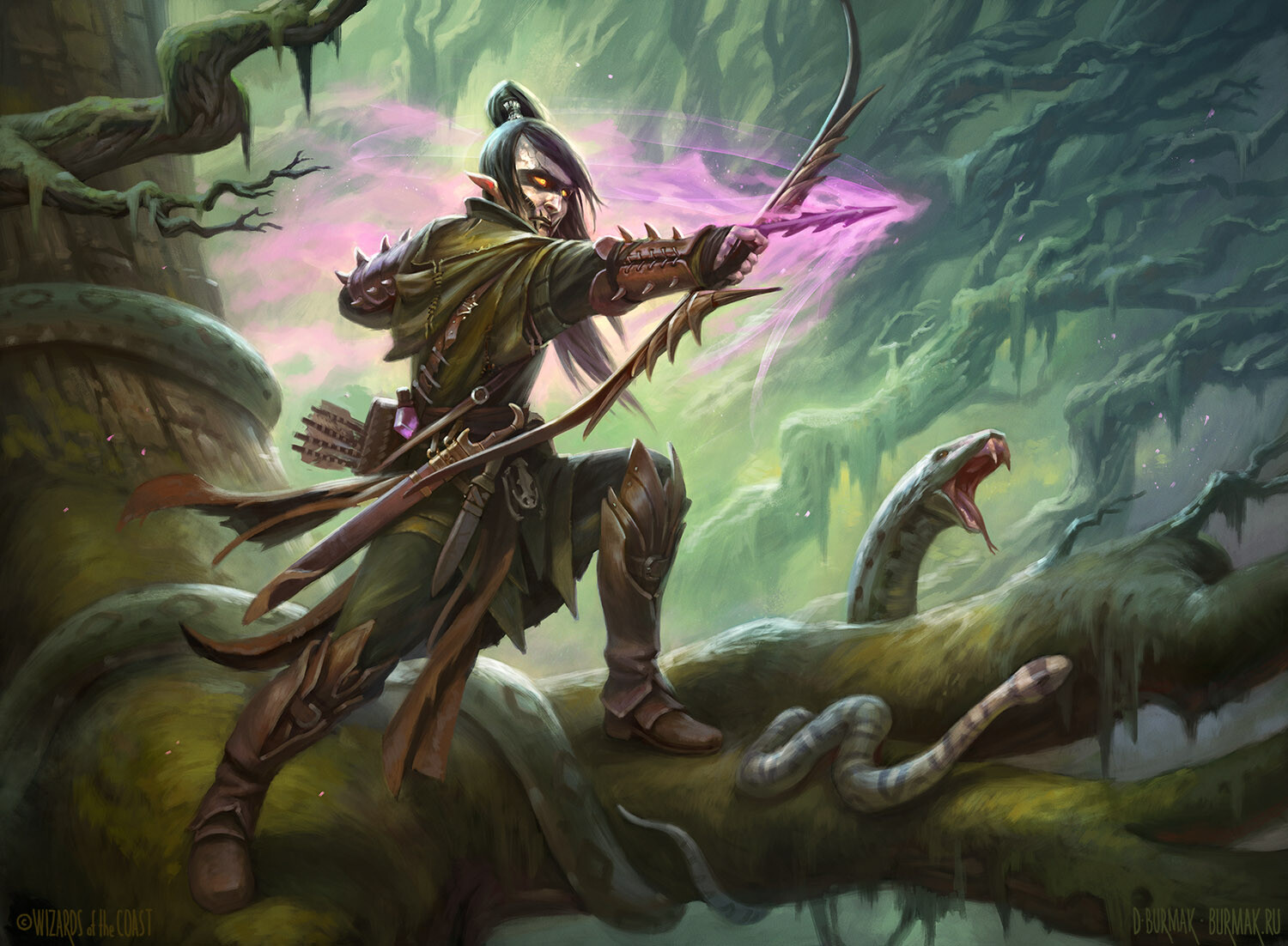


Coffee's Ranger Spell List
1st Level
- Absorb Elements
- Alarm
- Animal Friendship
- Beast Bond
- Catapult
- Comprehend Languages
- Cure Wounds
- Detect Evil and Good
- Detect Magic
- Detect Poison and Disease
- Ensnaring Strike
- Entangle
- Expeditious Retreat
- Feather Fall
- Find Familiar
- Fog Cloud
- Goodberry
- Hail of Thorns
- Hunter's Mark
- Identify
- Jump
- Longstrider
- Purify Food and Drink
- Searing Smite
- Snare
- Speak with Animals
- Sudden Awakening (UA)
- Wild Cunning (UA)
- Zephyr Strike
2nd Level
- Aid
- Alter Self
- Animal Messenger
- Barkskin
- Beast Sense
- Branding Smite
- Cordon of Arrows
- Darkvision
- Enhance Ability
- Find Traps
- Gust of Wind
- Healing Spirit
- Knock
- Lesser Restoration
- Locate Animals or Plants
- Locate Object
- Magic Weapon
- Pass Without Trace
- Protection from Poison
- See Invisibility
- Silence
- Skywrite
- Spike Growth
- Summon Beast
- Warding Bond
- Warding Wind
3rd Level
- Blinding Smite
- Conjure Animals
- Conjure Barrage
- Daylight
- Dispel Magic
- Elemental Weapon
- Feign Death
- Flame Arrows
- Glyph of Warding
- Lightning Arrow
- Magic Circle
- Meld into Stone
- Nondetection
- Plant Growth
- Protection from Energy
- Revivify
- Speak with Plants
- Sending
- Summon Fey
- Tongues
- Water Breathing
- Water Walk
- Wind Wall
4th Level
- Arcane Eye
- Conjure Woodland Beings
- Death ward
- Dominate Beast
- Elemental Bane
- Fabricate
- Freedom of Movement
- Grasping Vine
- Guardian of Nature
- Locate Creature
- Stoneskin
- Summon Elemental
5th Level
- Awaken
- Commune with Nature
- Conjure Volley
- Control Winds
- Dominate Person
- Greater Restoration
- Scrying
- Steel Wind Strike
- Swift Quiver
- Tree Stride
- Wrath Of Nature
Multiclassing:
Ability Scores: Dexterity 13 and Wisdom 13
Proficiencies: Light armor, medium armor, shields, simple weapons, martial weapons, one skill from the class's skill list, and the granted tool proficiency
Extra Attack: If you gain the Extra Attack class feature from more than one class, the features don't add together. You can't make more than two attacks with this feature unless it says you do (as the fighter version of Extra Attack does).
Survivalist Magic: If you have both the Spellcasting class feature and the Survivalist Magic class feature from the Ranger class, you can use the spell slots you gain from the Survivalist Magic feature to cast spells you know or have prepared from classes with the Spellcasting class feature, and you can use the spell slots you gain from the Spellcasting class feature to cast Ranger spells you know.
Find Traps (Fixed)
2nd-Level Divination (ritual)
- Casting Time: 1 action
- Range: 120 feet
- Components: V, S
- Duration: Concentration, up to 10 minutes
For the duration of the spell, you sense the location of any trap within range. A trap, for the purpose of this spell, includes anything that would inflict sudden or unexpected effect that you consider harmful or undesirable, it radiates a greater presence if it was specifically intended as such by a creator. The spell would sense an area affected by the alarm spell, a glyph of warding, a mechanical or natural pit trap, an unstable sealing, or a hidden sinkhole.
This spell reveals that traps are present, but you can only learn the location of a number of traps equal to your spellcasting ability modifier, and the general nature of the danger posed by the traps revealed to you.
You can choose to learn the location of another trap at the cost of one of the traps that you currently know the location of, as a bonus action.
Classes: Cleric, Druid, Paladin, Ranger
Why this
was made
I made this because I put too much thought on the ranger over the past 2 years, so here it is.
So I've made this now, if you want to contact me check my profile for my reddit and discord. Have a nice day, this is a threat.
Front Cover Art: Frej Agelii
Back Cover Art: Ifan ben-Mezd from Divinity

